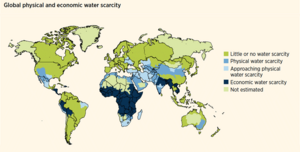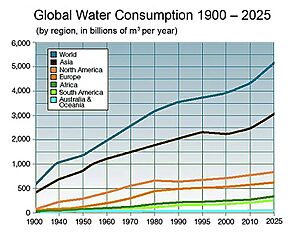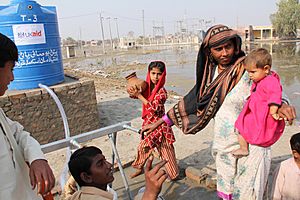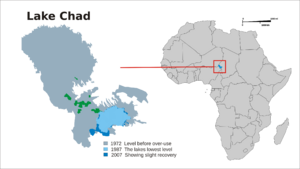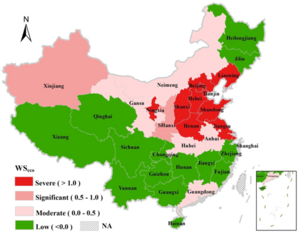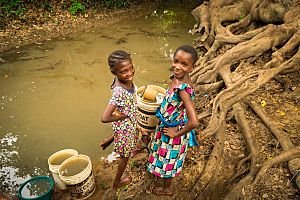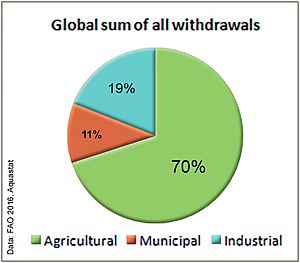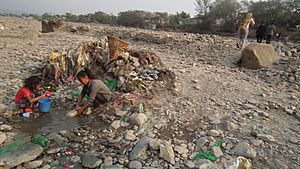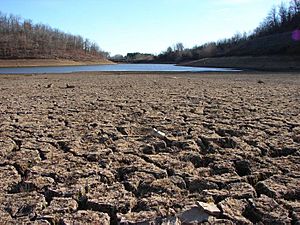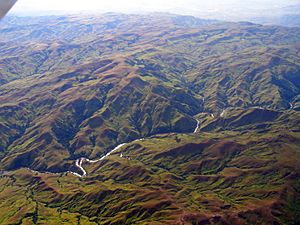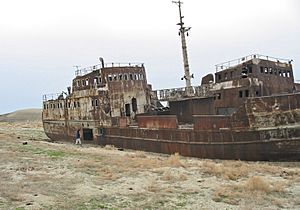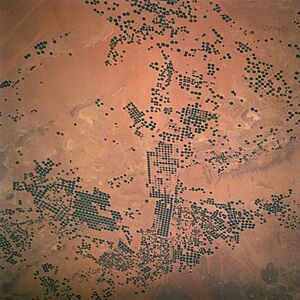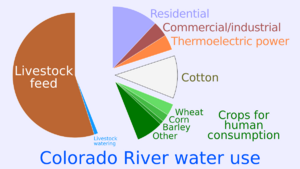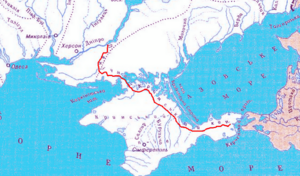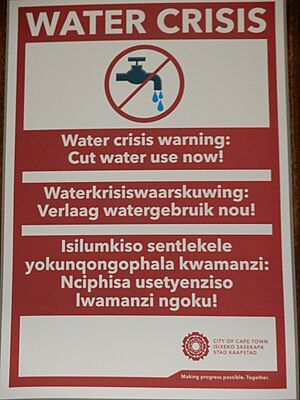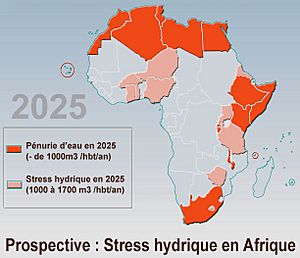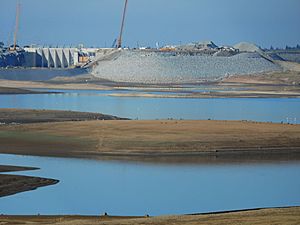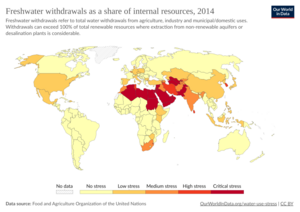Water scarcity facts for kids
Water scarcity means there isn't enough fresh water to meet everyone's needs. There are two main types: physical water scarcity and economic water scarcity. Physical scarcity happens when there simply isn't enough water in a place, even for nature. Dry areas like Central Asia and North Africa often face this. Economic scarcity occurs when water is available, but people don't have the right tools or money to get it from rivers or underground. Many people in Africa south of the Sahara desert experience this.
Even though there's enough fresh water on Earth overall, it's not always in the right place at the right time. This can be due to more people living in an area, changes in how people live and eat, or more farms needing water. Things like climate change (leading to droughts or floods), cutting down forests, water pollution, and wasting water also make the problem worse.
Scientists study water scarcity by looking at many things, including water in soil, water quality, and how much water nature needs. Water stress is one way to measure water scarcity. About half a billion people face severe water scarcity all year. Around four billion people experience it for at least one month each year. Many of the world's biggest cities also have water scarcity.
There are ways to help reduce water scarcity. These include managing how we use and supply water, countries working together, and saving water. We can also find new ways to get usable water, like cleaning wastewater or removing salt from ocean water (desalination). Reducing water pollution and changing how we trade "virtual water" (water used to make products) can also help.
What is Water Scarcity?
Water scarcity means there's not enough fresh water. It's a problem caused by humans. There are two main kinds: physical water scarcity and economic water scarcity. Some definitions also consider how much water nature needs to stay healthy.
Other terms you might hear are water stress and water risk. These terms are related but mean slightly different things. Water stress often describes the problems that happen because of water scarcity, like arguments over water or crops failing. It's measured by how much water is used compared to how much is available.
Types of Water Scarcity
Experts have identified two main types of water scarcity. These ideas came from a 2007 study that looked at how water was used in farming over 50 years. The study wanted to know if there would be enough water to feed the world's growing population in the future.
Physical Water Scarcity
Physical water scarcity happens when there isn't enough natural water to meet all needs. This includes the water that ecosystems (like forests and rivers) need to stay healthy. Dry places often have this problem. Human activities, like building too many dams for farming or energy, can also cause it, even where water seems plentiful. Signs of physical water scarcity include harm to the environment, falling groundwater levels, and some groups getting more water than others.
Many people live in very dry, crowded areas where less than 1,000 cubic meters of water are available per person each year. Examples include Central Asia, West Asia, and North Africa. A 2007 study found that over 1.2 billion people lived in areas with physical water scarcity. This mainly refers to water for food production, which uses much more water than drinking water.
Some scientists also talk about ecological water scarcity. This focuses on the water needs of nature. It means making sure there's enough clean water for healthy ecosystems.
Economic Water Scarcity
Economic water scarcity happens when a place doesn't have the money or technology to get water from rivers, underground sources, or other places. It also means there aren't enough skilled people to manage water supplies. This forces people to travel long distances to find water for their homes and farms. This water is often not clean.
The United Nations says that economic water scarcity is the most common reason for water shortages. This is because most countries actually have enough water for homes, industries, farms, and nature. But they can't deliver it easily to everyone. About a quarter of the world's population is affected by economic water scarcity. It's a big problem in many parts of Africa south of the Sahara.
Improving water systems in these areas could help reduce poverty. Investing in ways to store water and irrigate farms would help grow more food, especially in developing countries that rely on simple farming. Providing clean water also helps people stay healthy. This isn't just about new pipes; it also needs economic and political changes to fight poverty and inequality.
Measuring Water Scarcity
There are different ways to measure water scarcity. One way is to compare how much water is used to how much is available. This is called the "criticality ratio." Another way is the "Falkenmark Water Stress Indicator." This indicator says a country has "water stress" if its annual water supply drops below 1,700 cubic meters per person. If it drops below 1,000 cubic meters, the country faces "water scarcity."
However, these simple measures don't always show the full picture. For example, Canada and Brazil have lots of water, but still face water problems in some areas. Also, these measures often look at a whole country, which might not show local shortages.
More Detailed Ways to Measure
To get a better idea of water scarcity, experts need to look at many things. This includes water in the soil, water quality, how much water nature needs, and even "virtual water" (water used to make products that are traded). Since the early 2000s, scientists have used more complex computer models to study water scarcity. These models can look at different areas and times.
A good study of water scarcity brings together experts from different fields. These include scientists who study water, water quality, water ecosystems, and social issues.
Water Available on Earth
The United Nations estimates that only a tiny part of Earth's total water (about 0.014%) is fresh and easy for humans to use. Most of the water (97%) is salty, and nearly 3% is hard to reach, like in glaciers. The total amount of easily available fresh water is about 14,000 cubic kilometers. This includes water in rivers, lakes, and underground (aquifers). Humans use and reuse about 5,000 cubic kilometers of this.
So, technically, there's enough fresh water globally to meet the needs of the current world population of 8 billion people, and even more. But the problem is that water isn't spread evenly around the world, and some groups of people use much more than others. This makes water a scarce resource in certain areas.
Rivers and lakes are common sources of fresh water. But underground water (groundwater) and glaciers are becoming more important. Groundwater is water stored deep below the Earth's surface, which can be reached through springs or wells. Because of pollution and climate change, it's becoming harder to use traditional water sources. So, people are relying more on these other sources, especially as the world's population grows.
How Big is the Problem?
Current Situation
In 2019, the World Economic Forum said that water scarcity was one of the biggest global risks for the next ten years. Water scarcity can mean not having enough water at all, or having fights over water quality or quantity. It can also mean using up underground water too quickly, or harming the environment.
About half of the world's people now face severe water scarcity for at least part of the year. Half a billion people experience severe water scarcity all year long. Many of the world's largest cities also have water shortages. Almost two billion people don't have access to clean drinking water.
A study in 2016 found that the number of people suffering from water scarcity grew from 240 million (14% of the world) in the 1900s to 3.8 billion (58%) in the 2000s.
Future Outlook
In the last century, water use has grown more than twice as fast as the population. Water use is expected to increase by 50% in developing countries and 18% in developed countries by 2025. In Africa, between 75 and 250 million people are expected to lack fresh water. By 2025, 1.8 billion people will live in countries with absolute water scarcity, and two-thirds of the world's population could be under stress. By 2050, more than half of the world's population will live in water-stressed areas.
As global temperatures rise and water demand increases, it's likely that two-thirds of the population will live under water stress by 2025. The drying up of wetlands around the world (about 67% of them) has directly caused many people to be at risk of water stress.
The United Nations predicts that by 2040, about 4.5 billion people could be affected by a water crisis. As the population grows, more food will be needed, which means more water for farming. The World Economic Forum estimates that global water demand will be 40% higher than supply by 2030. These crises are not just about how much water there is, but also about its quality.
A study found that 6-20% of about 39 million underground water wells are at high risk of drying up if local groundwater levels drop by just a few meters. This could happen to more than half of major underground water sources if they continue to decline.
Effects of Water Scarcity
Not Enough Water Supply
How water is managed and shared can make scarcity worse. A 2006 United Nations report said that the main problem with water isn't a lack of water, but poor management. The report stated: "There is enough water for everyone." It added that water shortages are often due to "mismanagement, corruption, lack of proper organizations, slow government action, and not enough investment in both people and water systems."
Some experts argue that a lack of clear rules, government policies, and water subsidies have led to water problems. They say these factors make water prices too low and encourage people to use too much.
The clean water crisis affects about 785 million people worldwide. 1.1 billion people don't have access to water, and 2.7 billion face water scarcity for at least one month a year. 2.4 billion people suffer from dirty water and poor sanitation. Contaminated water can cause serious illnesses like cholera and typhoid fever, which are responsible for 80% of illnesses globally.
Harm to the Environment
Using water for homes, food, and industry greatly affects ecosystems around the world. This can happen even in places not considered "water scarce." Water scarcity harms the environment in many ways. It negatively affects lakes, rivers, ponds, wetlands, and other fresh water sources. This leads to using too much water, especially in farming areas. This overuse can cause problems like increased saltiness in water, pollution from nutrients, and the loss of floodplains and wetlands.
Over the last 100 years, more than half of Earth's wetlands have been destroyed. Wetlands are important homes for many animals like mammals, birds, fish, and insects. They also help grow rice and other food crops. And they filter water and protect against storms and floods. Large freshwater lakes, like the Aral Sea in Central Asia, have also suffered. The Aral Sea, once the fourth largest freshwater lake, has shrunk by over 58,000 square kilometers and become much saltier in just three decades.
Land sinking (subsidence) is another result of water scarcity. The U.S. Geological Survey estimates that subsidence has affected over 17,000 square miles in 45 U.S. states, with 80% of it due to using too much groundwater.
Plants and wildlife need enough fresh water. Marshes, bogs, and riverbanks clearly depend on a steady water supply. Forests and other upland ecosystems are also at risk when water becomes less available. Many wetlands have been taken over for human use, like farming and housing. Other areas have suffered because less fresh water flows into them as upstream water is used by humans.
Potential for Conflict
Water scarcity can also lead to more arguments between people and groups over water. For example, there have been conflicts over scarce water in the Middle East and North Africa, which can also lead to food shortages.
What Causes Water Scarcity?
Population Growth
About 50 years ago, people thought water would never run out. Back then, there were fewer than half the number of people on Earth today. People were also less wealthy, ate less meat, and needed less water for their food. They used only a third of the water we take from rivers now. Today, there's much more competition for water. This is because there are now 8 billion people, and they are eating more meat, which needs a lot of water to produce. Also, industries, cities, and farms growing crops for fuel are all using more water. In the future, even more water will be needed for food, as the world's population is expected to reach 9 billion by 2050.
In 2000, the world population was 6.2 billion. The UN estimates that by 2050, there will be an additional 3.5 billion people, mostly in developing countries that already have water problems. This will increase the demand for water unless we save and recycle more water. The World Bank explains that getting enough water for food will be a major challenge. We will need to balance getting water with using it in a way that doesn't harm the environment. We also need to consider the effects of climate change.
In 60% of European cities with over 100,000 people, groundwater is being used faster than it can be refilled.
Using Too Much Groundwater
The increase in population is making the competition for water worse. This is using up many of the world's major underground water sources (aquifers). This happens because of direct human use and water for farming. Millions of pumps are now taking groundwater all over the world. Farming in dry areas like northern China, Nepal, and India uses groundwater too quickly. Many cities, including Mexico City, Bangkok, Beijing, Chennai, and Shanghai, have seen their underground water levels drop by 10 to 50 meters.
Until recently, groundwater wasn't used much. In the 1960s, more and more groundwater sources were developed. Better knowledge, technology, and money made it possible to focus on groundwater instead of surface water. This led to a "groundwater revolution" in farming, which helped increase food production and develop rural areas. Groundwater provides almost half of all drinking water worldwide. The large amounts of water stored underground in most aquifers can act as a buffer. This means water can be taken out during droughts or when there's little rain. This is very important for people who can't rely on rain or surface water for their only supplies. It gives them a reliable water source all year.
Groundwater sources are quite plentiful. But a big concern is how quickly some groundwater sources can refill. Taking water from sources that don't refill could use them up if they aren't watched and managed properly. Using more groundwater can also make the water quality worse over time. Groundwater systems often show drops in natural outflows, stored amounts, and water levels, as well as water becoming polluted. Using too much groundwater can cause many problems. These include more expensive pumping, changes in water quality, land sinking, damaged springs, and reduced river flows.
More Farming and Industry
The main reason for water scarcity due to how we use water is the huge amount of water used in farming (especially for livestock) and industry. People in developed countries generally use about 10 times more water each day than people in developing countries. A large part of this is indirect use in water-intensive farming and industrial production of goods. Examples include fruits, oilseed crops, and cotton. Many of these products are made globally, so a lot of water use and pollution in developing countries happens to produce goods for people in developed countries.
Many underground water sources have been over-pumped and are not refilling quickly. This doesn't mean all fresh water is gone, but much of it has become polluted, salty, or otherwise unusable for drinking, industry, and farming. To avoid a global water crisis, farmers will need to grow more food to meet rising demands. At the same time, industries and cities will need to find ways to use water more efficiently.
Business activities like tourism are still growing. They need more water supply and sanitation. This can put more pressure on water resources and natural ecosystems. The expected 50% growth in world energy use by 2040 will also increase the need for efficient water use. This might mean some water use shifts from farming to industry, because power plants use water for steam and cooling.
Water Pollution
Water pollution happens when harmful substances, chemicals, or waste get into bodies of water like rivers, lakes, oceans, and groundwater. This makes the water unsafe or unusable for drinking, swimming, or supporting aquatic life. Pollution can come from many sources, including factories, farms, and sewage.
When water is polluted, it reduces the amount of clean, usable water available. Even if there's a lot of water, if it's dirty, it can't be used for many purposes, making clean water scarce.
Climate Change
Climate change can have a big effect on water resources worldwide because climate and the water cycle are closely linked. Rising temperatures will increase evaporation and lead to more rain. However, the amount of rainfall will vary in different regions. Both droughts and floods may become more frequent and severe in different places at different times. There will generally be less snow and more rain in a warmer climate. Changes in snowfall and snowmelt in mountains will also happen. Higher temperatures will also affect water quality in ways scientists don't fully understand. Climate change could also increase the need for irrigation in farming. There is now clear evidence that more variable weather and climate change have greatly affected water, and will continue to do so. This will show up in the water cycle, how much water is available, how much is needed, and how water is shared globally and locally.
The United Nations' FAO says that by 2025, 1.9 billion people will live in countries or regions with absolute water scarcity. It says two-thirds of the world's population could be under stress. The World Bank says that climate change could greatly change future patterns of water availability and use. This will make water stress and insecurity worse, both globally and in areas that depend on water.
Scientists have found that population changes are four times more important than long-term climate change in their effects on water scarcity.
Melting Glaciers
Many mountain glaciers around the world are shrinking due to rising temperatures. These glaciers are important sources of fresh water for many rivers, especially in Asia. When glaciers melt too quickly, they can cause floods at first, but then lead to water shortages later as their ice disappears. This affects the water supply for millions of people who rely on these rivers for drinking and farming.
Ways to Improve Water Scarcity
Managing Supply and Demand
A 2006 study said it's hard to tell if water is truly scarce globally (a supply problem) or if it's available but just needs to be used better (a demand problem).
The International Resource Panel of the UN says that governments have spent a lot of money on solutions that don't work well. These include huge projects like dams, canals, and pipelines. These projects are often not good for the environment or financially smart. The panel suggests that the best way to use less water while the economy grows is for governments to create complete water management plans. These plans should consider the entire water cycle: from where water comes from, to how it's used, cleaned, recycled, reused, and returned to nature.
Generally, there is enough water each year globally. The problem is more about when and where water is available. Reservoirs and pipelines can help with this changing water supply. Well-planned water systems, along with managing how much water people use, are necessary. Both managing supply and managing demand have their good and bad points.
Working Together Between Countries
Lack of cooperation can lead to water conflicts between countries, especially in developing nations. This often happens because of disagreements over how to share and manage water. For example, there was a dispute between Egypt and Ethiopia in 2020 over the Grand Ethiopian Renaissance Dam. Egypt worried the dam would reduce the amount of water it receives from the Nile River.
Saving Water
Water conservation means using water wisely and reducing waste. It's about making sure we have enough water for the future. This includes using less water in homes, businesses, and farms.
Saving water helps protect our natural water sources, like rivers and lakes. It also reduces the energy needed to treat and move water, which helps the environment.
Finding New Water Sources
We can also find new ways to get usable water. This includes cleaning wastewater and removing salt from ocean water.
Cleaning Wastewater and Reusing Water
Reclaimed water is wastewater that has been treated to a high standard so it can be used again for things like watering crops, industrial processes, or even refilling underground water sources. It's a way to make sure we don't waste water.
Wastewater treatment is the process of removing pollutants from used water (wastewater) before it's released back into the environment or reused. This process helps protect public health and the environment by preventing pollution.
Desalination
Desalination is a process that removes salt and other minerals from salty water, usually seawater, to make it fresh and safe to drink or use for other purposes. It's a way to create new sources of fresh water, especially in dry coastal areas.
Virtual Water Trade
Virtual water refers to the amount of water used to produce goods and services. For example, it takes a lot of water to grow crops or make clothes. When a country imports food or products, it's also "importing" the virtual water used to make them.
Understanding virtual water trade can help countries manage their water resources better. If a country is very dry, it might be smarter to import water-intensive products rather than growing or making them itself.
Examples Around the World
A group called CGIAR published a map showing the countries and regions with the most water stress. These include North Africa, the Middle East, India, Central Asia, China, Chile, Colombia, South Africa, Canada, and Australia. Water scarcity is also growing in South Asia. As of 2016, about four billion people, or two-thirds of the world's population, faced severe water scarcity.
More developed countries in North America, Europe, and Russia are generally not expected to face serious water threats by 2025. This is because they are wealthier and their populations are more in line with available water. However, North Africa, the Middle East, South Africa, and northern China will face very severe water shortages. This is due to not enough physical water and too many people for the water available. Most of South America, Africa south of the Sahara, southern China, and India will face water shortages by 2025. For these regions, water scarcity will be due to economic problems in getting safe drinking water and too much population growth.
Africa
Water scarcity is a big problem in many parts of Africa. This is due to a mix of physical water shortages and economic challenges. Many countries lack the money and infrastructure to provide clean water to everyone.
West Africa and North Africa
Water scarcity in Yemen is a growing problem. This is caused by population growth, climate change, poor water management, changes in rainfall, old water systems, and other human activities. As of 2015, Yemen is one of the countries suffering most from water scarcity. Most people in Yemen experience water scarcity for at least one month a year.
In Nigeria, some reports suggest that extreme heat, drought, and the shrinking of Lake Chad are causing water shortages and forcing thousands of people to move to neighboring towns and Chad.
Asia
A major report in 2019 by over 200 researchers found that the Himalayan glaciers could lose 66% of their ice by 2100. These glaciers feed Asia's biggest rivers, including the Ganges, Indus, Brahmaputra, Yangtze, Mekong, Salween, and Yellow River. About 2.4 billion people live in the areas drained by these Himalayan rivers. India, China, Pakistan, Bangladesh, Nepal, and Myanmar could experience floods followed by droughts in the coming decades. In India alone, the Ganges provides water for drinking and farming for over 500 million people.
Even with using too much of its underground water, China is facing a grain shortage. When this happens, it will likely push grain prices up. Most of the 3 billion people expected to be added worldwide by mid-century will be born in countries already facing water shortages. Unless population growth slows down quickly, some fear there might not be a peaceful or humane solution to the coming world water shortage.
It is very likely that climate change in Turkey will cause its southern river basins to have water scarcity before 2070, and increasing droughts in Turkey.
America
In the Rio Grande Valley in Texas, intense farming has made water scarcity worse. This has caused arguments over water rights on both sides of the U.S.-Mexico border. Some experts have said that this tension means new ways of managing water across borders are needed. Some have even compared these disputes to a war over shrinking natural resources.
The west coast of North America, which gets much of its water from glaciers in mountain ranges like the Rocky Mountains and Sierra Nevada, is also at risk.
Australia
Most of Australia is desert or semi-dry land, known as the outback. Water restrictions are in place in many parts of Australia due to ongoing shortages from drought. Environmentalist Tim Flannery predicted that Perth in Western Australia could become the world's first "ghost city." This would mean it's an abandoned city with no more water to support its people. In 2010, Perth had its second-driest winter on record, and the water company made water restrictions stricter for spring.
Some countries have already shown that it's possible to use less water while the economy grows. For example, in Australia, water use dropped by 40% between 2001 and 2009, while the economy grew by over 30%.
By Country
Water scarcity or water crisis in particular countries:
Lua error: too many expensive function calls.
Society and Culture
Global Goals
Sustainable Development Goal 6 aims for clean water and sanitation for everyone. It's one of 17 Sustainable Development Goals set by the United Nations in 2015. The fourth part of SDG 6 talks about water scarcity. It says: "By 2030, greatly increase how efficiently water is used in all areas and make sure fresh water is taken and supplied in a sustainable way to deal with water scarcity and greatly reduce the number of people suffering from water scarcity."
See also
 In Spanish: Escasez de agua para niños
In Spanish: Escasez de agua para niños
- Peak water
- Water conservation
- Water footprint
- Water issues in developing countries
- Water security
- Water crisis


